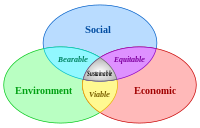
Photo from wikipedia
The concept of strong sustainability suggests that natural capital is irreplaceable and emphasizes that human natural consumption cannot exceed the carrying capacity of the ecological environment. In the realistic context… Click to show full abstract
The concept of strong sustainability suggests that natural capital is irreplaceable and emphasizes that human natural consumption cannot exceed the carrying capacity of the ecological environment. In the realistic context of tightening resource constraints and ecological degradation, how to explore the optimal economic and well-being output under certain ecological constraints has become an important topic in sustainability research. Ecological well-being performance (EWP) can comprehensively reflect the efficiency of natural resources and ecological inputs into the well-being level and has become an important tool for sustainable development research. Based on strong sustainability, this paper constructs an EWP evaluation index system. It decomposes EWP into two stages: ecological economy and economic well-being, which opens the “black box” of the ecological well-being conversion process. PCA-DEA, the network super-efficiency Epsilon-based measure (Network SEBM) model, and Geodetector are used to dynamically measure the EWP in the Three Gorges Reservoir Area (TGRA) from 2010 to 2020 and analyze its spatial and temporal characteristics and influencing factors. The results show that (1) temporally, the EWP in the TGRA shows an increasing trend from 2010 to 2020, but the overall level is low. Spatially, it shows a high pattern in the east and low in the west, and spatial differences are gradually decreasing; (2) ecological economic efficiency is significantly lower than economic well-being efficiency, and ecological economic efficiency is the main reason limiting the improvement in EWP in the TGRA. The ecological well-being situation of the TGRA is not optimistic; (3) there is an overall problem of excessive ecological input and insufficient per-capita GDP and well-being output in the TGRA, and decisions should be made according to local conditions; (4) the level of economic development has an EWP level that plays a dominant role and also has a greater relationship with the policy system, socioeconomic conditions, and natural environment.
Journal Title: International Journal of Environmental Research and Public Health
Year Published: 2023
Link to full text (if available)
Share on Social Media: Sign Up to like & get
recommendations!